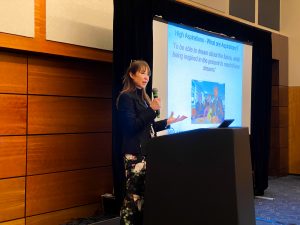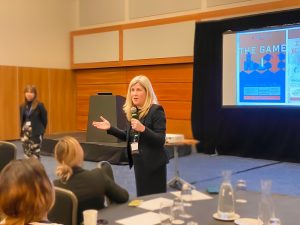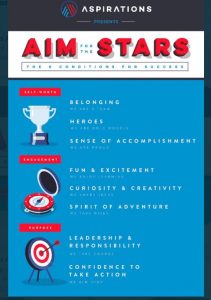Inspiring Girls in STEM Challenge Day at Futures Institute Banbury
The Girls in STEM Day kicked off with a motivating talk from a female ambassador at the...
Read more Inspiring Girls in STEM Challenge Day at Futures Institute BanburyThe first TES Education Expo took place last week in London and brought together schools and teachers from across the country.
Teachers, Principals and CEOs from Aspirations Academies Trust attended to share their experience, knowledge and provide a warm greeting to anyone interested in working for us and the career opportunities we can provide.
Our South Coast CEO Kate Redman gave an uplifting talk on the benefits of our No Limits Curriculum, which is unique to the Aspirations Academies Trust, and the positive impact it has on teaching.
Many teachers who attended the event spoke afterwards about how fascinating they had found the discussion to be.
For those unable to attend the TES event, Ms Redman’s talk is published below.

‘‘Aspirations is the ability to dream and set goals for the future while being inspired in the present to reach for able to dream about the future, while being inspired in the present to reach those dreams.
These uplifting words sum up the ethos of our Multi-Academy Trust and the aim of our No Limits Curriculum: to help students achieve their goals and wishes.
The Aspirations Trust has key values which underpin all the work that we do within our schools: the values of Self Worth, Engagement and Purpose drive all the decisions that we make in terms of creating the highest quality of provision for our students.
Our Trust also has 8 conditions for learning and 9 guiding principals which focus the development of the way we plan our educational experiences.
The Trust has also outlined ten key future skills; these skills were defined after meeting with a number of businesses and gaining feedback on what skills are important to prepare students for their future.
We believe that we need to work together to create a learning environment and opportunities which meet the needs for a future where the drivers of change – life expectancy, the impact of technology – will have a bearing upon our lives and more importantly the work lives of our students.

The future skills that we have outlined are threaded to be an integral part of the way that we plan and deliver our No Limits curriculum. (Atlantic Academy Principal Lesley Bishop who is pictured above also attended to provide real-life examples of how No Limits is sewn into the curriculum with great effect).
Collaboration – the way to build relationships and work within a team are essential; if we do not work with our young people to guide them into how to forge successful relationships both their professional and personal lives will be less rich.
There are very few jobs which require someone to work in isolation so the ability to communicate effectively and efficiently with a team and with others is an essential life skill.
Why did we introduce the new curriculum? The Trust believes in ensuring that students are able to make real, relevant and effective connections within their learning.
Introducing the No Limits curriculum within KS3, 4 and 5 has transformed the way learning is presented to our students.
The units are planned to ensure strong and relevant connections between different curriculum areas – so that subjects are not taught in isolation*.
The impact has been overwhelming positive – students talk about their learning with enthusiasm; low level disruptive behaviour has been significantly reduced; there are higher levels of progress and improved academic success.
Units are planned to challenge our students; for example, a recent unit for Year 7 tasked them to create play script for a scene from Romeo and Juliet but within the context of World War One.
This required the students to have a deep understanding of the both the play and the historical context a world war in order to be able to complete the task effectively.
Each unit has a driving question that initiates and focuses the learning. Students have an opening event which is designed to harness their enthusiasm for the project and establish how the learning will be developed.
Learning is sequenced and time is taken to ensure that this planned carefully to ensure that our students know more and can do more and have the opportunity to apply their knowledge within a relevant context. Learning is revised and layered.
*Some subjects that do not fit within a unit of work are taught as a single discipline this is to ensure that there is still full curriculum coverage.

The Girls in STEM Day kicked off with a motivating talk from a female ambassador at the...
Read more Inspiring Girls in STEM Challenge Day at Futures Institute BanburyIn February, five Aspirations Academies were involved in the Year 9 Future Ready Programme, delivered by Speakers...
Read more Year 9 Future Ready Programme LaunchesThe first Aspirations Employability Diploma final of 2025 marked a significant milestone in the academic year, bringing...
Read more AAT Celebrates First Aspirations Employability Diploma Final of 2025